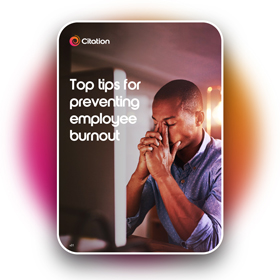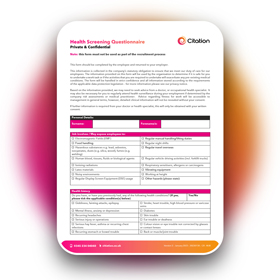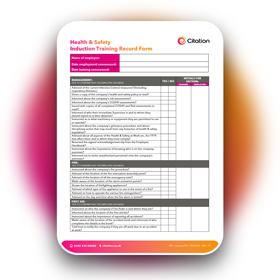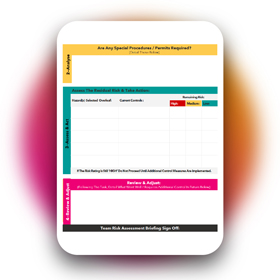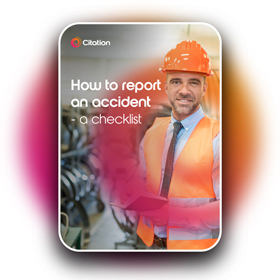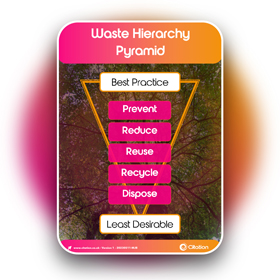Archives for Gary Cooper
How to identify stress in the workplace
Did you know that 914,000 workers suffered from work-related stress symptoms in 2021/22? That’s a fairly big number – so you can see why we’re bringing attention to the issue. Pressures at work can contribute to stress which can easily spill over into people’s daily life.
We know you put your employees’ well-being at the top of your list, so it’s important to get clued up on the signs of work-related stress so you can support your workers through tough times. Stress, anxiety and depression made up 51% of all work-related ill health cases in 2021/22 – let’s lower that.
What are the signs of work-related stress?
Stress at work can come from a lot of different places. Whether it stems from out-of -work situations or in-work situations, it can affect all of your staff differently. If you notice anyone acting differently than usual, then it might be worth checking in on them.
You might see stress having an impact on an individual employee or even a whole team. In any case though, acting quickly makes it easier for you to reduce or remove the causes of the stress and create a happier workplace.
Identifying work-related stress symptoms
Concerned that your employees are suffering from stress? We’ve listed the types of workplace stress below and how to resolve them.
Signs of stress in your employees
When you’re looking for signs your employees might be suffering from stress, it’s crucial to stay alert. Are any of your employees often absent from work, with no real reason? If so, take note; absenteeism is a key indicator of someone struggling with stress at work. They could also be turning up late for work or just finding ways to spend less time in the workplace. But we’re not saying that you need to jump on your staff if they have a few days off with a cold – it’s just something to be aware of.
Signs of work-related stress aren’t just limited to physical indicators either. If you see a dip in their performance or mood at work, something could have knocked their confidence and motivation. So, when you’re concerned about employees’ work levels, why not check with them if there’s anything you can do to help?
Signs of stress in your team
You might spot some wider indications when it comes to stress in your team. From more frequent arguments, complaints, and a higher staff turnover. A high-stress environment is not a place people want to work, leading to employees leaving to find other work.
Reports of stress and increased absences could lead to a lower team performance, which leads to loss of revenue for your business – which no one wants. So how can you eradicate (or at least reduce) workplace stress? Well, a stress risk assessment is your best friend.
The importance of conducting a workplace stress risk assessment
Ultimately, all employers have to assess the stress risks of their staff under the Management of Health and Safety at Work Regulations 1999. And it also falls under the Health and Safety at Work Act 1974 where employers are to “ensure, so far as reasonably practicable, the health, safety and welfare” of all their employees. But we know you’re not just here to make sure you meet the legalities of it all. You genuinely care about your amazing team! Which brings us to another important reason…
Supporting your staff before, and when they are experiencing workplace stress symptoms brings huge benefits to you and your team. It gives them confidence at work because they know you’re there for support whenever they need it. And because of this, you’ll help build a more productive, happier team who hit their targets and enjoy working for your business.
What to include in a stress risk assessment
There’s plenty you should consider including and addressing in your stress risk assessment. And actually, The HSE have developed 6 stress management standards that employers can implement to help reduce work-related stress. Let’s break it down.
Demands – Can your employees cope with the demands of their job? High demands = high stress. You could try to evaluate workloads and make sure it’s achievable and realistic.
Control – How much control do your employees have over how they work? Try giving them more control so they can use their own initiative and ways of working. Welcome and encourage new skills, because at the end of the day, individual people know how they work best.
Support – Are your team aware of the support on offer? It’s worth thinking about what policies and procedures are available to staff. Try to cover as many bases as possible.
Relationships – How’s the relationship between your staff? Unfortunately, bullying and harassment does happen in some workplaces, and as an employer it’s your duty to prevent this and address unacceptable behaviour.
Role – Do your employees fully understand their role? Systems should be in place to stay clear of any role conflict, whether that’s a process to report it, clearly defined expectations of roles or proper training and mentorship.
Change – Are your staff told about changes at work? Any changes that can impact employees should be shared so everyone is on the same page and can properly prepare.
Need a hand creating, storing, distributing or updating risk assessments? We’re here for you with workplace risk assessment support. And, our Health & Safety consultants and intelligent Atlas hub take the hassle and complexity out of workplace risk assessments.
The difference between work pressure and stress
Pressure makes diamonds, right? That’s true, and pressure is inevitable in any job. But not everyone deals with pressure well, and there’s a fine line between work pressure and stress. This is where communication is key. Some people love targets to drive them forwards, others prefer to work in a different way. Which is why having regular one-to-ones with your staff will help you make sure they’re happy with their workload – and manage it if they’re not.
